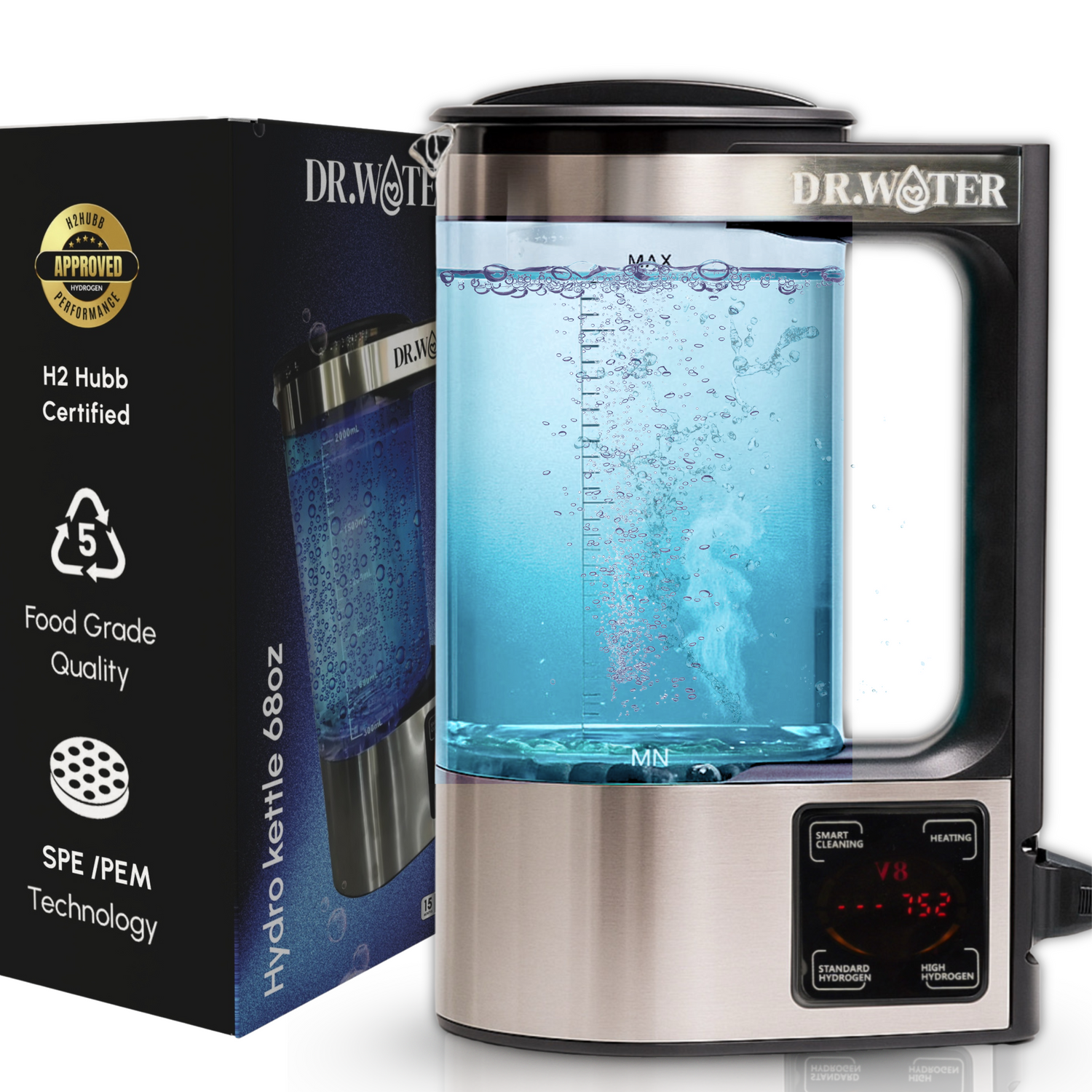
Choosing the Best Material for Your Reusable Water Bottle
Share
Summary
|
Switching to a reusable water bottle is one of the best things you can do for your health and the environment—plus, it saves around 156 plastic bottles every year. But not all bottles are created equal. The material you choose affects water purity, durability, and safety, so it’s important to know which one is the best for your needs.
In this blog, we’ll discuss what are reusable water bottles made of, break down the safest materials for reusable bottles, discuss their pros and cons, and help you make an informed choice.
Why The Material of Your Reusable Bottle Matters
When choosing a reusable water bottle, safety isn’t just about avoiding toxins—it’s also about durability, taste, and overall performance. The right material can prevent unwanted flavors, resist wear and tear, and even impact how well your bottle insulates.
Whether it’s stainless steel, glass, or BPA-free plastic, each option comes with its own benefits and trade-offs. Here’s how the material affects:
- Water Taste – Certain materials can hold onto flavors or leach chemicals, affecting how your water tastes.
- Durability – A sturdy bottle should resist cracks, dents, and general wear over time.
- Temperature Control – Some materials keep drinks cold (or hot) for hours, while others don’t insulate as well.
- Bacteria Resistance – The best bottles resist microbial buildup and are easy to keep clean.
With that in mind, let’s explore what are reusable water bottles made of and which materials are your best and safest choices.
The 4 Best Materials for Your Reusable Water Bottle
1. Glass: The Purest Choice
- Glass is widely considered the safest material for water bottles, making it ideal for those who want the cleanest drinking experience.
- Unlike plastic or metal, it’s completely non-toxic, won’t leach chemicals, and doesn’t retain lingering flavors.
- Most high-quality glass bottles use borosilicate glass, which is more resistant to thermal shock and breakage than regular glass.
- This makes it a more durable option for those worried about fragility while still enjoying the benefits of pure-tasting water.
- A study measuring ATP (adenosine triphosphate) levels, which indicate general cleanliness, found that glass bottles had lower ATP readings than metal bottles.
- This suggests that glass bottles tend to harbor fewer bacteria, making them an even more hygienic option.
Best for: Those who prioritize water purity and want a safer, more durable alternative to regular glass.
2. Stainless Steel: Durable and Non-Toxic
- Stainless steel is one of the most durable and reliable materials for reusable water bottles, making it a popular choice for long-term use.
- Unlike regular steel, it contains chromium, which creates a protective layer that prevents rust and corrosion.
- High-quality stainless steel bottles use food-grade 18/8 stainless steel (18% chromium, 8% nickel), which resists oxidation and does not react with acidic beverages.
- This ensures your water stays pure without any metallic taste or leaching of harmful substances.
- Double-walled insulated stainless steel bottles also offer excellent temperature control, keeping drinks cold for hours or hot when needed.
Best for: Those looking for a rough, tough, and well-insulated bottle that maintains drink temperature throughout the day.
3. BPA-Free Plastic: The Lightest Option
- Not all plastics are created equal. While some contain harmful chemicals like BPA, high-quality reusable bottles are often made from BPA-free Tritan plastic, which is designed to be safer and more durable.
- Unlike traditional plastic, Tritan is resistant to shattering, making it a practical choice for those who need a lightweight and travel-friendly bottle.
- However, even BPA-free plastic has its drawbacks. Over time, it can absorb odors and flavors from different beverages, and frequent washing may lead to gradual wear.
- While it’s more durable than regular plastic, it still doesn’t match the longevity of stainless steel or glass.
Best for: Those looking for a budget-friendly, lightweight bottle for everyday use, sports, or travel.
4. Titanium: The Premium Choice
- Titanium is one of the most advanced materials for reusable bottles, offering exceptional strength, lightweight design, and complete corrosion resistance.
- Unlike stainless steel, titanium is naturally non-reactive, meaning it won’t leach metals, alter the taste of your water, or corrode over time.
- Despite its ultra-lightweight feel, titanium is incredibly strong, making it a great option for those who want a durable bottle without added bulk.
- However, titanium bottles are expensive, often significantly more than stainless steel or glass alternatives.
Best for: Those who want an ultra-durable, lightweight, and taste-neutral bottle and are willing to invest in a premium option.
These are the best materials for your reusable water bottle. Each material has its pros and cons, so what matters most is to choose the one that best aligns with your preferences.
Now, let’s discuss some materials you should generally avoid or at least be cautious about while buying reusable water bottles.
Materials to Avoid or Be Cautious About
When choosing a reusable water bottle, some materials can pose potential health, durability, or maintenance concerns. Here’s what to avoid or approach with caution.
1. Low-Quality Plastic (Especially with BPA & Other Toxins)
- Some plastics, especially older or lower-grade ones, contain Bisphenol A (BPA), which has been linked to hormonal disruptions.
- Even BPA-free plastics can degrade over time, especially with heat exposure, potentially leaching microplastics into your water.
- Plastic bottles also tend to retain odors and stains, making them harder to keep fresh.
2. Aluminum (Unless Properly Lined)
- Aluminum bottles require an inner lining (often plastic or epoxy-based) to prevent metal leaching.
- If the lining wears down or is of poor quality, harmful chemicals like BPA or phthalates can be introduced into your drink.
- Aluminum is softer than stainless steel, making it prone to dents that can compromise the integrity of the lining.
3. Copper (For Daily Use)
- Copper bottles are sometimes marketed for health benefits, but drinking too much copper-infused water can be harmful over time.
- They require careful maintenance to prevent oxidation and a metallic taste.
- If improperly lined, prolonged exposure to water can lead to excess copper intake, which may cause digestive issues.
4. Silicone Bottles (Too Soft for Long-Term Use)
- While BPA-free and flexible, silicone bottles are not as durable as other materials.
- They can absorb odors and stains over time, making them harder to keep fresh.
- Some lower-quality silicone bottles may contain fillers that compromise their safety and longevity.
- The soft structure makes them prone to collapsing or difficult to drink from, especially for everyday use.
Now that you have all the information you need to choose the right material for your reusable water bottle, here’s a smart and safe one. Additionally, its use has many health benefits. Let’s take a look.
A Smarter, Safer Upgrade: Dr. Water’s HydroStanley
If you’re looking for a glass water bottle that does more than just hold water, Dr. Water’s hydrogen water bottles are a standout choice.
- Made from high-quality borosilicate glass, they’re not only one of the safest options but also enhance the quality of your water by infusing it with molecular hydrogen.
- Studies suggest that hydrogen-rich water may help combat oxidative stress, boost energy, and support overall health.
- It provides these health benefits while using a platinum-coated membrane to remove chlorine and ozone, ensuring your water stays pure and chemical-free.
If you’re looking for a safe, high-quality, and health-enhancing bottle, Dr. Water’s HydroStanley might be worth considering.
Conclusion
The right material makes a big difference in keeping your water clean and safe. Borosilicate glass is the best pick for pure-tasting water without any chemical leaching, while stainless steel and titanium offer durability and insulation. On the other hand, lower-quality plastics and aluminum bottles with questionable liners aren’t worth the risk—they can break down over time and contaminate your drink.
If you want more than a basic bottle, Dr. Water’s HydroStanley goes a step further. Its hydrogen infusion tech, premium glass build, and platinum-coated membrane remove chlorine and ozone, ensuring cleaner, safer water every time you take a sip.

